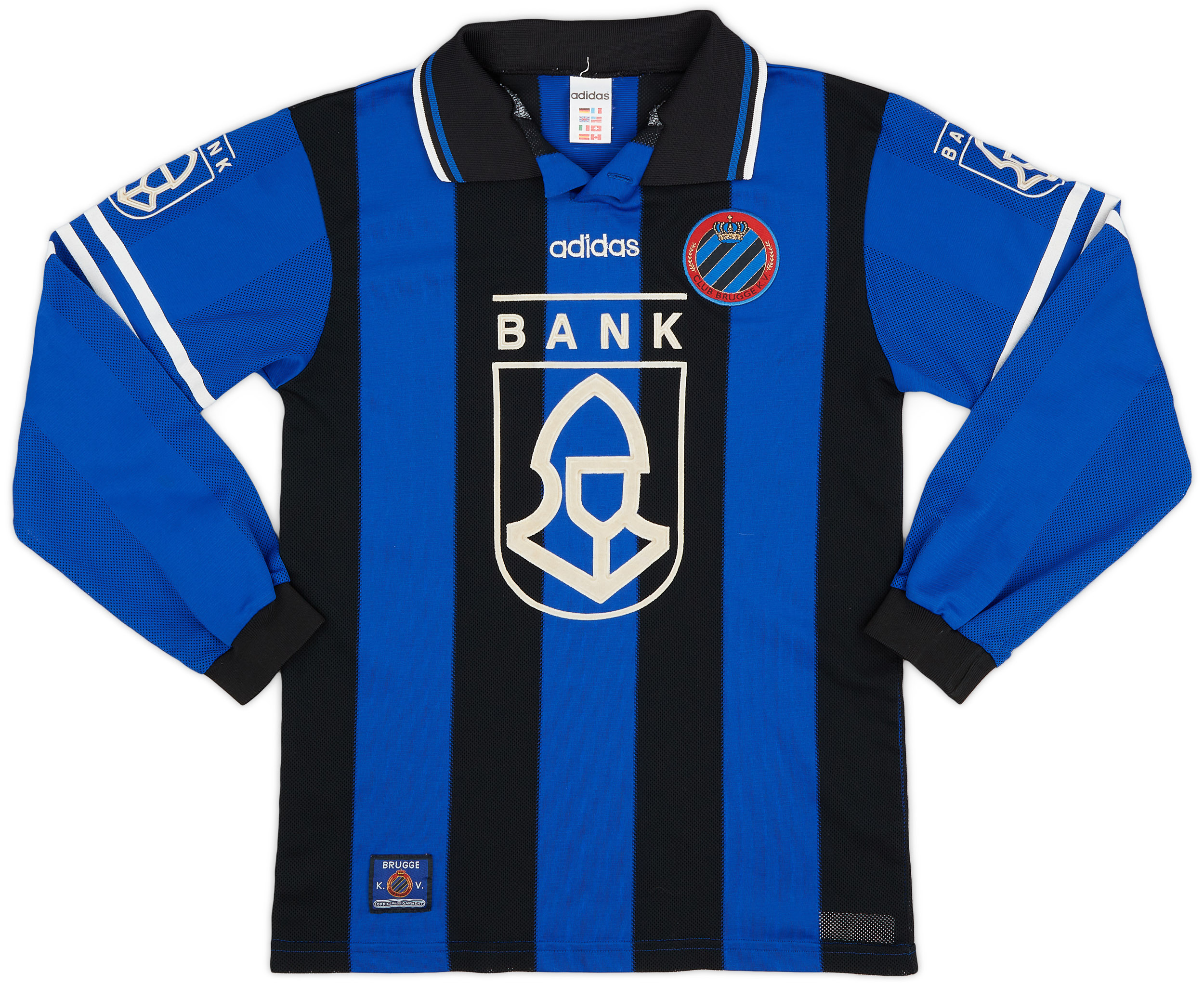Club Brugge
Introduction Club Brugge, a prominent football club based in Bruges, Belgium, is steeped in rich history and tradition. Founded in 1891, the club has become a symbol of excellence in Belgian football and has cultivated a fiercely dedicated fanbase. With a motto that embodies ambition and resilience, “Be Blue, Be Bruges,” Club Brugge has established […]
1996-97 Club Brugge Away Shirt - 9/10 - (XL)
177.99£ - ca: €210
1998-99 Club Brugge Home Shirt - 8/10 - (XL)
148.99£ - ca: €176
1996-97 Club Brugge adidas Padded Bench Coat - 8/10 - (XL)
148.99£ - ca: €176
1998-99 Club Brugge Home Shirt - 9/10 - (L)
148.99£ - ca: €176
1997-98 Club Brugge Home Shirt - 8/10 - (XL)
148.99£ - ca: €176
2000-02 Club Brugge Player Issue Home L/S Shirt - 6/10 - (L)
148.99£ - ca: €176
1996-97 Club Brugge adidas Rain Jacket - 9/10 - (XXL)
148.99£ - ca: €176
2000-01 Club Brugge Match Issue Away L/S Shirt #6
148.99£ - ca: €176
1995-96 Club Brugge Home Shirt - 6/10 - (L)
129.99£ - ca: €153
1998-99 Club Brugge Home Shirt - 9/10 - (M)
124.99£ - ca: €147
2004-05 Club Brugge adidas Padded Bench Coat - 8/10 - (L/XL)
118.99£ - ca: €140
1999-00 Club Brugge Home Shirt - 6/10 - (XL)
118.99£ - ca: €140
1998-99 Club Brugge adidas Track Jacket - 7/10 - (M/L)
106.99£ - ca: €126
2000-01 Club Brugge adidas Padded Bench Coat - 7/10 - (L)
106.99£ - ca: €126
1998-99 Club Brugge adidas Track Jacket - 7/10 - (XL)
106.99£ - ca: €126
1996-98 Club Brugge adidas Training Shirt - 8/10 - (XL)
94.99£ - ca: €112
2002-04 Club Brugge Home L/S Shirt - 8/10 - (XL)
94.99£ - ca: €112
2007-08 Club Brugge Player Issue Third L/S Shirt - 8/10 - (S)
82.99£ - ca: €98
2001-02 Club Brugge adidas Rain Jacket - 8/10 - (XL)
82.99£ - ca: €98
2004-05 Club Brugge adidas Track Jacket - 9/10 - (S)
82.99£ - ca: €98
2010-11 Club Brugge Home Shirt - 8/10 - (L)
70.99£ - ca: €84
1998-99 Club Brugge Home Shirt - 8/10 - (Y)
70.99£ - ca: €84
2009-10 Club Brugge Away Shirt - 8/10 - (L)
70.99£ - ca: €84
2006-07 Club Brugge GK Shirt Stijnen #1 - 7/10 - (S)
70.99£ - ca: €84
2007-08 Club Brugge Home Shirt - 6/10 - (L)
58.99£ - ca: €70
2008-09 Club Brugge GK Shirt - 8/10 - (XXL)
58.99£ - ca: €70
2017-18 Club Brugge Third Shirt - 9/10 - (XXL)
58.99£ - ca: €70
2010-11 Club Brugge GK S/S Shirt - 9/10 - (XL)
58.99£ - ca: €70
1997-98 Club Brugge Home L/S Shirt - 8/10 - (L.Boys)
58.99£ - ca: €70
2018-19 Club Brugge Away Shirt (3XL)
53.99£ - ca: €64
2012-13 Club Brugge Away Shirt - 7/10 - (M)
53.99£ - ca: €64
2008-09 Club Brugge Player Issue Home Shirt - 7/10 - (S)
53.99£ - ca: €64
2015-16 Club Brugge Home Shirt - 7/10 - (S)
47.99£ - ca: €57
2000-02 Club Brugge Home Shirt - 8/10 - (XS.Boys)
41.99£ - ca: €50
2008-09 Club Brugge Authentic Home L/S Shirt - 10/10 - (XL.Boys)
41.99£ - ca: €50
2016-17 Club Brugge Home Shirt - 6/10 - (S)
41.99£ - ca: €50
2007-08 Club Brugge GK Shirt - 5/10 - (L)
35.99£ - ca: €42
2010-11 Club Brugge Home Shirt - 6/10
35.99£ - ca: €42
2010-11 Club Brugge Home Shirt Hoefkens #4 - 4/10 - (M)
29.99£ - ca: €35
2008-09 Club Brugge Puma Track Jacket (L)
29.99£ - ca: €35
2010-11 Club Brugge Away Shirt - 5/10 - (M)
29.99£ - ca: €35
2006-07 Club Brugge adidas Polo Shirt - 7/10 - (M)
29.99£ - ca: €35
2011-12 Club Brugge Puma Training Shirt - 9/10 - (M)
29.99£ - ca: €35
2010-11 Club Brugge Home Shirt - 9/10 - (L.Boys)
23.99£ - ca: €28
2018-19 Club Brugge Home Shorts (XXL)
6.99£ - ca: €8
Warning: A non-numeric value encountered in /var/www/netskribent.dk/retro-football-shirt.com/wp-content/themes/boot5/single-clubs.php on line 148
Introduction
Club Brugge, a prominent football club based in Bruges, Belgium, is steeped in rich history and tradition. Founded in 1891, the club has become a symbol of excellence in Belgian football and has cultivated a fiercely dedicated fanbase. With a motto that embodies ambition and resilience, “Be Blue, Be Bruges,” Club Brugge has established itself as a powerhouse in both domestic and European competitions.
Club History
The origins of Club Brugge can be traced back to its founding in the late 19th century. The club’s genesis was marked by the ambition of local sports enthusiasts who sought to promote football within the community. In 1895, Club Brugge played its first official match, setting the stage for a prolific journey ahead. The club quickly rose through the ranks of Belgian football, and in 1901, it celebrated its inaugural championship victory, a feat that laid the foundation for future successes.
Throughout the 20th century, Club Brugge faced various challenges, including world wars and shifting football dynamics, yet it consistently demonstrated resilience. The club achieved notable triumphs in the 1970s and 1980s, firmly cementing its status in Belgian football folklore. One pivotal moment in its history came in 1976 when Club Brugge reached the UEFA Champions League final (then the European Cup) but fell just short against Bayern Munich, signaling its potential on the European stage.
Achievements
Club Brugge’s trophy cabinet boasts an impressive array of titles, reflecting the club’s success over the decades. As of October 2023, the club has won the Belgian First Division A a remarkable 17 times, with its most recent championship victory occurring in the 2019-2020 season. Additionally, the club has claimed the Belgian Cup on 11 occasions, showcasing its domestic dominance.
On the international scene, Club Brugge has made significant strides, particularly in European competitions. The club’s most notable achievements include reaching the aforementioned European Cup final in 1976 and the UEFA Europa League final in 2016, where they faced off against Manchester United. Although titles on the European front remain elusive, Club Brugge’s consistent performances have established it as a formidable opponent throughout Europe.
Significant Players and Matches
Over the years, Club Brugge has been home to numerous iconic players who have made lasting impacts on the club’s identity. One such player is Jan Ceulemans, a legendary forward who represented the club from 1974 to 1991. Ceulemans became an emblematic figure for fans, contributing significantly to the club’s success during his time.
Another standout player is Ruud Vormer, who joined the club in 2012 and became a vital component of Brugge’s midfield. His leadership and skill have helped the team secure multiple league titles, and he is celebrated for his dedication to the club. Memorable matches, such as the thrilling encounters against arch-rivals Anderlecht, have not only defined seasons but also captured the hearts of fans, making them unforgettable fixtures in the football calendar.
Cultural Impact
Beyond its achievements on the pitch, Club Brugge plays a vital role in the cultural fabric of Bruges and Belgium as a whole. The club’s passionate fanbase, known as the “Blauw-Zwart,” creates an electrifying atmosphere in the Jan Breydel Stadium, making match days a celebrated event in the city. The loyal supporters have cultivated a strong sense of community, contributing to local pride and identity.
Moreover, the club’s influence extends into social initiatives and programs focused on youth development. Club Brugge emphasizes nurturing young talent through its academy, promoting not just football skills but also important life values. This commitment to community building further solidifies the club’s position as a cornerstone of local culture.
Conclusion
In summary, Club Brugge stands as a testament to the rich history and vibrant culture of Belgian football. With its impressive achievements both domestically and internationally, coupled with a passionate fanbase and commitment to community involvement, the club has left an indelible mark on the sport. As Club Brugge continues to look toward the future, it remains a beloved institution in football history, embodying the spirit of a community united through their love for the game.












































